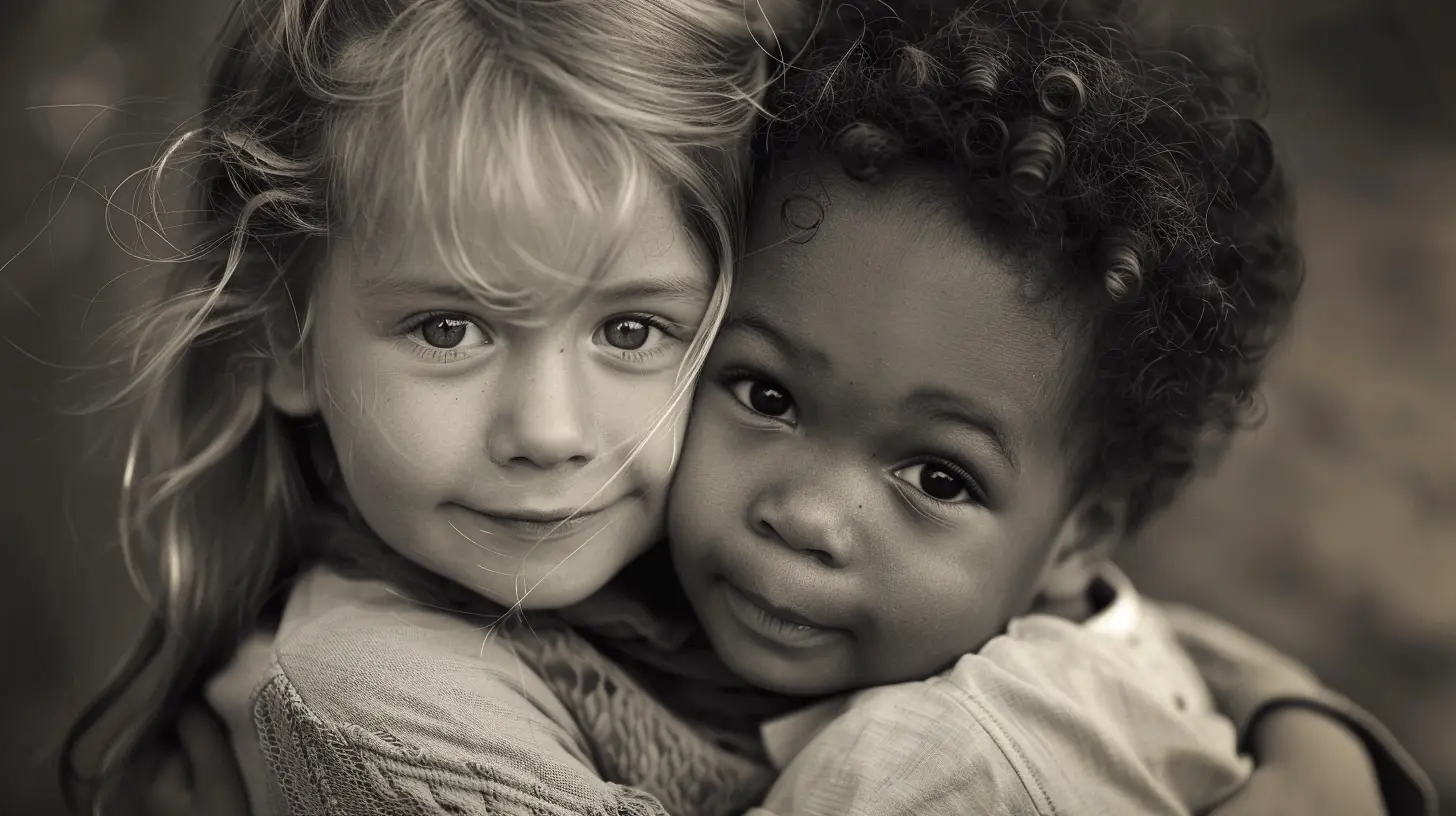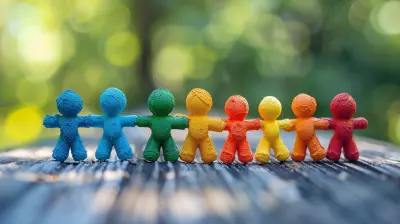Raising Empathetic Children: The Science Behind Compassion
7 March 2025
Empathy is more than just a simple act of kindness; it’s a powerful tool that helps us understand and connect with others on a deeper level. In today’s fast-paced world, raising empathetic children can feel like a tall order. But here's the thing—teaching empathy can be one of the most rewarding and impactful lessons you can give your child.
But how do we raise children to be compassionate in a world that sometimes feels anything but? And what does science tell us about the development of empathy? Let’s dive into the fascinating world of compassion, its psychological roots, and how you, as a parent or caregiver, can nurture this essential trait in your child.

What is Empathy?
Before we jump into the science and how-to's, let’s first define empathy. Empathy is the ability to put yourself in someone else's shoes—mentally and emotionally. It’s about recognizing and understanding the feelings of others, even when you haven’t experienced the same situations.There are two main types of empathy:
1. Cognitive Empathy: This is about understanding another person’s perspective. It’s like knowing what someone else might be thinking or feeling based on their situation.
2. Emotional Empathy: This involves actually feeling another person’s emotions. You don’t just recognize their sadness; you feel it, too.
Both types of empathy are crucial for building strong social bonds and fostering compassion. And guess what? Empathy is something that can be nurtured from a very young age.

Why Empathy Matters for Children
Empathy plays a fundamental role in developing social and emotional skills. It helps children:- Form healthier relationships with peers and adults.
- Resolve conflicts in a more compassionate way.
- Develop a greater sense of self-awareness and emotional regulation.
In a world where bullying, discrimination, and social isolation are major concerns, empathy serves as a buffer. Children who are empathetic are less likely to engage in aggressive behavior and more likely to stand up for others in need. In short, empathy is a superpower that fosters not just individual growth but also a more compassionate society.

The Science Behind Empathy
Hardwired for Compassion
Did you know that humans are biologically wired for empathy? Yup! Neuroscientists have found that specific areas of the brain, like the anterior insula and anterior cingulate cortex, light up when we experience empathy. These regions help us process emotions and understand what others are going through.Even more fascinating is the concept of "mirror neurons." These are brain cells that fire both when we perform an action and when we see someone else perform that same action. For example, if you see someone stub their toe, your mirror neurons react as if you just stubbed your own toe. Ouch, right?
Empathy in Infants and Toddlers
You might be surprised to learn that empathy begins to develop very early in life. Studies suggest that babies as young as six months old show signs of empathy. For instance, when a baby hears another baby crying, they often start to cry too—this is a form of emotional empathy.By the time children reach the toddler stage (around 2-3 years old), they begin to exhibit more advanced forms of empathy. They might try to comfort a crying friend by offering a hug or a toy. While their understanding of emotions is still in its early stages, these small acts of kindness are the building blocks of a compassionate future.
The Role of Genetics and Environment
As with most traits, empathy is influenced by both genetics and environment. Research suggests that some people may be more naturally empathetic due to their genetic makeup. However, environmental factors—like how a child is raised—play an equally important role.Parental Influence: Children learn empathy primarily through imitation. If you model compassionate behavior, your child is more likely to follow suit. This is why creating an empathetic home environment is key to raising empathetic kids.
Social Experiences: Interactions with peers, teachers, and other adults also contribute to empathy development. Group play, for instance, teaches kids about sharing, taking turns, and resolving conflicts—all of which require a certain level of empathy.

Nurturing Empathy in Children: Practical Tips
If you're wondering how to raise an empathetic child, don’t worry—you don’t need a psychology degree to make it happen. Here are some practical strategies, backed by science, to nurture empathy in your child.1. Model Empathy in Everyday Life
Children are like little sponges—they absorb everything around them. One of the best ways to teach empathy is by modeling it yourself. Show kindness and understanding in your daily interactions, whether it's helping a neighbor or simply listening attentively when someone is speaking.For example, if you see someone struggling with heavy bags, offer to help and explain to your child why you did it. "I saw that person needed help, so I thought I'd lend a hand. It’s important to be kind to others."
2. Encourage Emotional Literacy
Helping your child understand and label emotions is a critical step in building empathy. Encourage them to talk about their feelings and the feelings of others. Ask questions like, "How do you think your friend felt when you shared your toy?" or "What do you feel when you're sad?"Books, movies, and stories can also be excellent tools for teaching emotional literacy. Ask your child to discuss how the characters might be feeling and why. This helps them practice putting themselves in another person’s shoes.
3. Teach Compassion Through Action
Empathy isn’t just about understanding someone’s feelings; it’s also about taking compassionate action. Encourage your child to help others, whether it's within the family or the community.Volunteering as a family is a great way to put empathy into action. Whether it's visiting a nursing home, participating in a charity event, or simply helping a neighbor, these activities teach children that empathy goes beyond feelings—it’s about making a positive impact.
4. Praise Empathetic Behavior
Whenever your child displays empathy, make sure to acknowledge it. Positive reinforcement helps children understand that their actions are valued. Simple phrases like, "I noticed how kind you were to your friend when they were upset. That was very thoughtful of you," can go a long way in fostering a compassionate mindset.5. Encourage Perspective-Taking
One of the most powerful ways to develop cognitive empathy is by encouraging your child to see the world from someone else’s perspective. You can do this by asking questions like, "How would you feel if that happened to you?" or "What do you think your friend is going through right now?"Role-playing can also be a fun and effective way to practice perspective-taking. Pretend to be characters in various scenarios and ask your child how they would react or feel in those situations. This builds their ability to understand different viewpoints.
6. Limit Exposure to Negative Influences
While it’s impossible to shield children from all negative influences, you can help guide them toward more positive ones. This might mean limiting violent or aggressive media and encouraging shows, books, and games that promote cooperation, understanding, and kindness.Peers also play a significant role in shaping behavior. Encourage your child to form friendships with kind, respectful kids, and guide them through tricky social situations where empathy might be needed.
7. Encourage Open Communication
Make your home a safe space where emotions and thoughts can be freely expressed. Encourage open and honest conversations about feelings, problems, and social situations. Ask your child how they feel about certain situations and listen attentively without judgment.When children feel heard and understood, they are more likely to extend that same courtesy to others.
Challenges in Raising Empathetic Children
Of course, raising empathetic children isn’t always smooth sailing. There will be times when your child struggles to grasp someone else’s feelings, or when they act out of frustration or anger. That’s completely normal. Developing empathy is a lifelong process, and everyone has moments of selfishness or misunderstanding.When your child exhibits a lack of empathy, resist the urge to punish them harshly. Instead, use it as an opportunity to teach. Ask them to reflect on their behavior and discuss how they could have handled the situation differently. Over time, these small lessons add up.
The Long-Term Benefits of Raising Empathetic Children
Raising empathetic children isn't just about making the world a kinder place—though that's certainly a noble goal. Empathy also benefits your child in profound ways. Studies show that empathetic children grow up to be more successful both personally and professionally. They tend to have better relationships, higher emotional intelligence, and even improved physical health.In the workplace, empathy is increasingly recognized as a critical leadership skill. So by nurturing empathy in your child, you’re not only helping them succeed socially but also setting them up for future success in their careers.
Final Thoughts
Raising an empathetic child is one of the greatest gifts you can give—not just to your child but to the world. While empathy may come naturally to some, it’s also a skill that can be cultivated and strengthened throughout life. By modeling compassion, encouraging emotional conversations, and helping your child take the perspective of others, you’re laying the foundation for a more compassionate and understanding future.So, start today. Teach your child that empathy is not just a feeling; it’s an action. And in a world that could always use a little more kindness, that’s a lesson worth sharing.
all images in this post were generated using AI tools
Category:
ParentingAuthor:

Jenna Richardson
Discussion
rate this article
6 comments
Skye Sheppard
What an uplifting read! It’s heartwarming to see the science of compassion highlighted. Let’s nurture empathy in our kids and watch them thrive in a caring world! 🌈💖
April 3, 2025 at 3:16 PM

Jenna Richardson
Thank you! I’m glad you found it uplifting. Nurturing empathy is indeed vital for a brighter future! 🌟
Velma Jacobs
What a lovely read! It’s so important to nurture empathy in our little ones. The science you shared really highlights how compassion can be cultivated through simple everyday moments. Let’s all strive to raise a generation that cares deeply—one small act at a time!
March 27, 2025 at 6:00 PM

Jenna Richardson
Thank you for your kind words! I completely agree—small acts of kindness can have a profound impact on nurturing empathy in children. Let’s keep inspiring each other!
Otto McGonagle
Empathy cultivates a brighter future!
March 24, 2025 at 5:00 PM

Jenna Richardson
Absolutely! Empathy is key to fostering compassionate individuals who contribute positively to society.
Jacqueline Malone
This insightful article highlights the importance of nurturing empathy in children, emphasizing that fostering compassion not only benefits them but also strengthens our communities.
March 19, 2025 at 3:52 AM

Jenna Richardson
Thank you for your thoughtful comment! I'm glad you found the article beneficial in emphasizing the value of empathy in children and its positive impact on our communities.
Juliana Wright
What a beautifully insightful article! Nurturing empathy in our children is essential for a compassionate future. Your exploration of the science behind this skill is both enlightening and inspiring. Thank you for sharing these valuable insights—I can’t wait to implement them!
March 9, 2025 at 5:28 PM

Jenna Richardson
Thank you for your kind words! I'm glad you found the insights valuable and hope they foster empathy in your children.
Aria McCallum
Empathy is a powerful gift! Nurturing it in our children shapes a kinder, more compassionate future.
March 7, 2025 at 4:30 PM

Jenna Richardson
Absolutely! Nurturing empathy in children fosters not only their emotional intelligence but also a more compassionate society. Thank you for highlighting this important aspect!
MORE POSTS

Cultivating Emotional Resilience: Practical Strategies for Everyday Life

The Role of Collective Effervescence in Strengthening Social Bonds

How to Support a Loved One Struggling with Depression

Understanding How Children Develop Problem-Solving Skills

The Role of Behavioral Psychology in Weight Management